Following a protracted seven-month break driven by escalating political unrest in Haiti, Royal Caribbean International is poised to re-establish its presence in Labadee, the cruise line’s private resort. The anticipation culminates today with the arrival of the Adventure of the Seas, to be followed shortly by the Symphony of the Seas. This decision comes amidst complex circumstances including recent changes prompted by Hurricane Milton. Despite the potential for a resurgence in tourism, this return raises significant questions about safety and the implications of political instability in the region.
In March, Royal Caribbean suspended voyages to Labadee due to rampant violence fueled by gang activities in Haiti, which have included prison breaks and attacks that garnered international attention. During this period, both U.S. and United Nations personnel began to withdraw, highlighting an increasingly precarious situation. The combination of social media alerts from passengers noting Labadee on their itineraries and the subsequent public inquiry led to Royal Caribbean’s confirmation regarding its imminent return. Nevertheless, the ongoing violence makes this decision particularly contentious.
Recent reports indicate that while Royal Caribbean plans to resume services, the political landscape remains fraught. A brutal incident in Pont-Sonde reportedly resulted in the deaths of at least 70 individuals just days ago, further complicating the overall security scenario. Therefore, the line’s statement emphasizing guest and crew safety reflects the broader apprehension surrounding travel to Haiti.
Royal Caribbean’s strategic approach includes robust monitoring of the developing situation in Haiti, engaging its Global Security and Intel Team to assess risks accurately. Importantly, Labadee is geographically segregated from the wider instability, enclosed within a secured environment that aims to protect passengers and crew. This level of caution is not only prudent but necessary as travelers embark on cruises that may inadvertently lead them through regions of unrest.
Despite reassuring measures taken by Royal Caribbean and its fencing off of Labadee, skepticism remains. The U.S. State Department’s advisory remains in effect, warning Americans against traveling to Haiti due to significant safety risks. These advisories weigh heavily on consumer sentiment and could directly affect the viability of the cruise line’s return, regardless of its operational aspirations.
While the imminent return of various ships—including the Explorer of the Seas and Freedom of the Seas—indicates a hopeful outlook, one must consider the broader implications. The juxtaposition of a thriving private tourism sector against a backdrop of instability raises ethical questions about the sustainability of such operations. As Royal Caribbean endeavors to renew its commitment to bringing tourists to Labadee, the outcome remains uncertain and contingent on both the domestic political climate and global perceptions of safety.
Royal Caribbean’s re-entry into Labadee represents not just a firm resolve to reinstate tourism but a complex gamble against a volatile backdrop. As we observe the unfolding scenario, it will be pivotal to assess the longer-term impacts on both the cruise line and the broader tourism landscape in Haiti, particularly as political dynamics continue to evolve.


Leave a Reply